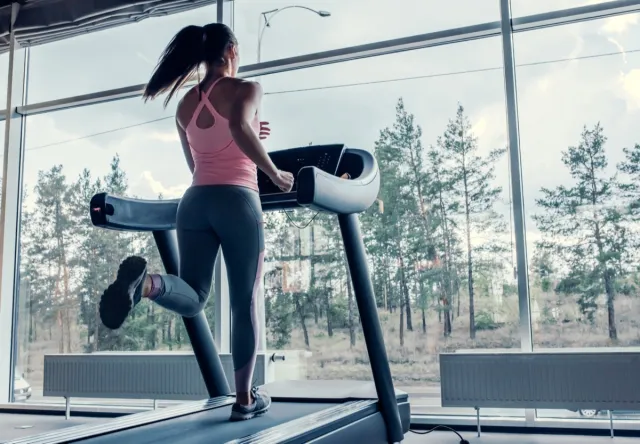Larissa Pereira in Bathing Suit Celebrates “25 Weeks of Sophia”

Brazilian influencer Larissa Pereira is enjoying the beautiful sandy beaches of the Maldives—and sharing some very special news with fans. The wife of Liverpool soccer star Roberto Firmino posted a series of photos of herself wearing a black and white swimsuit, displaying a baby bump that indicates baby number four is on the way. “25 Weeks of Sophia,” she captioned the post. How does she stay so fit? Read on to see 5 ways Pereira stays in shape and the photos that prove they work—and to get beach-ready yourself, don’t miss these essential 30 Best-Ever Celebrity Bathing Suit Photos!
Treadmill Sessions

Pereira travels a lot with her husband, but makes a point of hitting the treadmill at hotel gyms whenever possible. “Exercise has a dramatic antidepressive effect,” says David J. Linden, PhD. “It blunts the brain’s response to physical and emotional stress. Voluntary exercise is the single best thing one can do to slow the cognitive decline that accompanies normal aging.”
Eggs and Fruit For Breakfast
Pereira enjoys a protein-fuelled breakfast of eggs and fresh fruit. “Eggs are one of the best dietary sources of choline,” says registered nutritionist Jo Lewin. “This little talked about nutrient is needed by every one of us for the formation of cell membranes and for brain function, including memory. It’s especially important during pregnancy and breastfeeding, when an adequate supply of choline is essential for normal brain development.”
Protein-Style Burgers
Pereira prefers lettuce wraps to bread for her burgers. “Variety and color are key to a healthy diet,” says Hrvard Health. “On most days, try to get at least one serving from each of the following categories: dark green leafy vegetables; yellow or orange fruits and vegetables; red fruits and vegetables; legumes (beans) and peas; and citrus fruits.”
Steak and Asparagus
One of Pereira’s favorite dishes, especially when she’s in New York, is steak and asparagus. “Asparagus is a rich source of folate, a vitamin which is important for making red blood cells and for cell division – the synthetic version of this vitamin is folic acid,” says registered nutritionist Nicola Shubrook. “Folate is an essential nutrient during pregnancy because it is needed for foetal development and protects against neural tube defects including spina bifida. Just 120g of asparagus (boiled) will provide your daily reference intake (RI) (200mcg). However, the NHS recommends that women planning a pregnancy or in the first trimester of pregnancy obtain 400mcg of folic acid a day.”
Seafood and Avocado
Pereira loves seafood dishes, especially with avocado on the side—which is especially good during pregnancy if it’s low-mercury. “Seafood, which includes fish and shellfish, can be a great source of protein, iron and zinc — crucial nutrients for your baby’s growth and development,” says the Mayo Clinic. “The omega-3 fatty acids in many fish, including docosahexaenoic acid (DHA), also can promote your baby’s brain development.”




